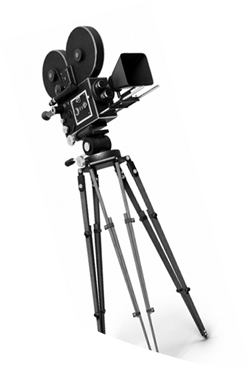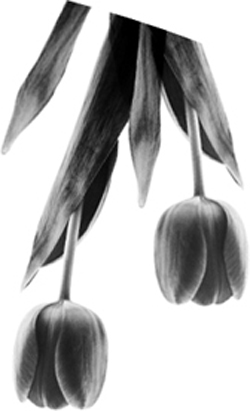Kino (13 page)
Authors: Jürgen Fauth

“That wasn't supposed to happen,” Penelope said to me. I told her she'd been wonderful, and she beamed back. She knew it was true. I was sure, then, that she could love the movies, that she would love me, that all would be well and she'd be mine.
Everyone was in high spirits when we shot the final scene, the windmill amidst a sea of flowers. We'd gone over budget, but in a gesture for which I will always be grateful, Ray put up the money for additional tulips, carpeting the entire studio in bright bloom. Penelope kissed me that nightâone single, tantalizing kiss before she pushed me away.
Then I holed up in the editing room. For two months, I was eating, sleeping, and breathing film, hunched over the editing desk between hanging strips of celluloid. With scissors and glue I sped through time, manipulated events at my whim, and shaped the raw images into a tale like a god. I learned to make shots talk to each other and found rhythms and resonance in the fractions of black between the frames.

My whole life culminated in the triumphant night when
Tulpendiebe
opened and I finally made Penelope mine. Salvatore Luna had painted the façade of the Ufa-Palast am Zoo with a mural of beautiful flowers, and the lobby and twin staircases were lined with thousands of glorious tulips in bloom. Murnau was there, and Emil Jannings, Asta Nielsen, Conrad Veidt, Brigitte Helm! My old Scheunenviertel landlords had come out in their best Sunday clothes, and my brother Heinz, who'd moved his business headquarters to Berlin, was there as well.
Tulpendiebe
should have been a disaster, but instead it turned out a miracle, not at all what I had set out to do, but stranger and better. Penelope was perfect. Only three years had passed since Steffen had taken me to
Nosferatu
, and here we were, the images I had dreamed up cast against the screen for all to see. I have never been more proud, have never loved every frame of a movie as much as I loved
Tulpendiebe
that night. When the last frame faded, the audience erupted into a thunderstorm of applause. I took my bows, and in that moment, I realized the tulip thief was me.
At the reception, Penelope and I were the center of attention. Thea kissed my cheeks but Fritz was too proud to pay his respects, holding court by the bar. I chatted with a young film critic by the name of Billy Wilder. Two unexpected guests congratulated us: Anna and Leo Greifenau, Penelope's parents.
Penelope couldn't hide her surprise. “Didn't you find it vulgar and glamorous, my beauty objectified and my intellect immaterial?”
“Oh Penelope,” the professor said. “I just want you to be happy. And you, young man. Quite lyrical, the story about the tulip. The erratic movements of the market correspond to the movements of the heart, do they not?”
I basked in my success, but all I wanted was to leave with Penelope, more beautiful than ever, stunning in her white silk gown. She was a brand-new movie star, and I was not her director any more. That night, we made love until the sun came up over Friedrichshain.

The newspapers raved, calling
Tulpendiebe
“lucid and full of meaning,” while
Metropolis
, that turgid piece of overblown shit, couldn't earn back its budget. A
Landei
and a cripple, I had transformed myself into Klaus Kino, the
Wunderkind
of Neubabelsberg, the youngest-ever director in the history of Ufa, a favorite with the critics and the public! I was in love with myself, with Penelope, with the pictures we were making on the screen.
I bought a villa in Charlottenburg and an American cabriolet that we drove across the Alps to Lake Como. Drunk on red wine and mad with the romance of it all, I proposed. Penelope explained to me, at length, that marriage was a tool of the patriarchyâand then, surprising as ever, accepted. We were married that very night, in a musty church in Bellagio with the local fishmonger as witness and a town of strangers celebrating our love.
Penelope Greifenau had become Penelope Koblitz, our vacation had become a honeymoon, and we were as happy together as we'd ever be. We drove on to Venice the next morning.
What happened next cast a dark shadow over our young marriage. At a café just off the Piazza San Marco, we were recognized by a professor from Tübingen, and he and his students joined us for Ramazzotti and soda. They were full of praise for
Tulpendiebe.
Penelope, who pretended she didn't care, loved the attention, and we promised to visit them at the basilica, where they were restoring mosaics.
Herr Dokter, have you seen San Marco? Infinite labyrinths cover the floor and every glittering inch of the gilded walls is layered with intricate Byzantine detail, pointing beyond itself, suggesting infinite possibility. I was getting lost in the ornaments of the gem-encrusted altar piece when an infernal sound came growling up through the building. In the left transept, by the chapel of St. Isidor, Penelope and I watched the tall scaffolding on which the professor and his students worked on the ceiling collapse. The wooden frame tore apart under its own weight, sending tools and bodies flying.
When the last echo of the destruction died down, we moved toward the heap, which was still shrouded by a cloud of dust. There were indistinct voices, people crying out in pain, desperate whispers for help. Trapped underneath a large crossbeam, we could make out the smashed face of the professor, distorted into a mask of agony.
Tulpendiebe
has been lost for decades, so there is no way you could possibly understand. I realize my current position further undermines my credibilityâbut try, if you can, to believe me. At
Tulpendiebe
's climax, the evil tulip notary, played by Otto Gröninger, dies in a conflagration under the collapsing parts of a burning windmillâan extremely difficult shot, one of the best in the movie. There was something deeply moving about his death: at the last possible moment, we discover empathy for the villain, as he, himself, discovers that his fate is bound to all others. It is a moment of pure cinema, Herr Dokter, and one of the most truthful things I ever put on film.
There was no fire in Venice, but what Penelope and I saw in the basilica as we approached the heap of rubble, handkerchiefs pressed to our faces, was precisely what the audience sees at the end of
Tulpendiebe
, down to the framing, the angle, the beams crossed like a game of deadly pickup sticks, and beneath it all, the doomed man's face, not quite dead but aware of the approaching inevitability, his eyes wide to take in the last of what life would show him. There was no mistaking it, Herr Dokter: there was a connection, an undeniable connection, between my film and the professor's agonizing death.
It was dispiriting and horrid, and after the ambulances and the
Carabinieri
arrived, we wandered the streets of Venice till dawn. I'd seen worse back in Königstein where I had witnessed my brother Jupp die, where I watched as
Dokters
sawed off my limb, but Penelope couldn't stop crying. Our honeymoon was ruined, and we returned to Berlin.
Chapter 10
Dr. Hanno lifted Mina off the last rung of the ladder down to the cobblestone yard just as the first of their pursuers swung his leg over the roof. Mina's arms trembled, with exhaustion or fear, she didn't know. Dr. Hanno was holding her a moment too long, but she didn't mind. She had made it down safely.
Her suitcase hadn't been so lucky. It had smashed in two, and all of Mina's honeymoon clothesâthe little red dress, the flippers, the towels they had stolen from the hotelâhad gone flying all over the yard. She grabbed what she could and stuffed it into her knapsack. The snorkel mask had cracked. Her favorite dress wouldn't fit.
One by one, the suited men appeared at the edge of the roof and began to climb down. Or rather, they
slid,
moving downwards without actually seeming to move their limbs. They were descending quickly, and they weren't shouting Mina's name anymore. She found herself wishing they did; their silence was more threatening than when they had still bothered to shout.
Mina was still cramming clothes into the knapsack when Dr. Hanno grabbed her by the shoulder. “Frau Koblitz. There is no time.” She slung the bag over her shoulder and left the broken suitcase behind. Trailing underwear, they ran through an alleyway lined with locked bicycles and rows of colorful trash cans and out into the street. They found themselves in the middle of a very long block. A few buildings to their right, a streetcar was pulling up to a stop. They were out of breath but kept on running, running. The streetcar driver closed the doors in their faces and pulled away.
“What now?” Mina rested her hands on her knees, trying to catch her breath. Any moment, the men who were chasing them would appear through the alleyway.
“Keep going,” Dr. Hanno commanded, leading them down the sidewalk, where to Mina wasn't sure. In front of a wide staircase, a bent old man shook his cane at Mina; she was in his way. She moved aside, and he disappeared through a heavy wooden door. The sign said “
Türkisches Dampfbad
.”
“What does that mean?” Mina asked.
“It's a spa.”
Mina grabbed Dr. Hanno's elbow and pulled him up the stairs.

They sat next to each other on wooden benches, breathing in hot eucalyptus-scented air, dripping sweat, and trying awkwardly to keep their towels aligned. The spa was a beautifully designed neo-classical bathhouse with vaulted ceilings, tiles with elaborate mosaics covering every surface, and a variety of recessed saunas arranged around a large central pool.
It was also coâed and all nude.
Dr. Hanno had his towel carefully tied around his waist, but Mina's kept slipping, revealing her breasts. Mina knew how jealous Sam would get if he knew where she was, with this German film professor. He was handsome, almost. She knew she wouldn't mention this part to Sam.
“You could've told me this was all nude.”
“You were up the stairs before I could say anything.”
“At least they won't follow us in here. They're nothing without their suits.”
“I wouldn't be so sure. But I don't think they saw us.”
The plan was to hide out until Frank came to pick Mina up and take her to the airportâTempelhof instead of Tegel, where the men might be waiting for her.
They had found the least hot sauna, a good vantage from which to observe the spa's main room through the glass door. The spa was filled with old naked people. A few were younger and good-looking, but most everybody else seemed well over fifty. Nobody seemed to be the slightest bit embarrassed by the nudity. There was a lot of sagging flesh on display.
“How many of these people do you think were Nazis?” Mina wondered out loud.
“Not all Germans were Nazis,” Dr. Hanno said. “It was one thing to be in the party or the SS, but most people were just trying to survive during those years.”
“Do you think any of them have seen Kino's movies?”
Dr. Hanno didn't seem to have an answer. Mina felt his awkwardness and decided to give it another twist.
“Maybe he used to come here for bathhouse orgies or something. Do you think this used to be a place for hooking up?”